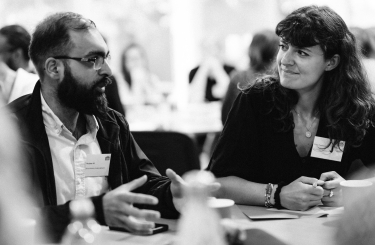Related


As part of our learning programme on place, we spoke with Erel Onojobi from the Runnymede Trust about their Power to Prosper programme, which is rooted in four areas across England that are challenging the racialised nature of poverty and debt, while supporting grassroots organisations to build power through community organising and asset ownership.
Erel shared her reflections on why relationships matter more than data when working in place, why funding ecosystems over partnerships can unlock deeper collaboration in local areas and more.
Erel: Power to Prosper is about building a movement and an ecosystem that challenges the racialised nature of poverty and debt, while also imagining a future where racialised communities have ownership - of land, property, and the tools to drive their own change through community organising.
We’re working with 20 grassroots organisations across four regional hubs - Greater Manchester, Lambeth, Newham, and Nottingham. The Greater Manchester hub presents a unique example: it’s a co-op of 10 women-led groups supporting women and girls across issues like domestic abuse, mental health, and financial empowerment. They’ve created a seamless “one-door” approach to services, with internal referrals and a “tell your story once” ethos that local authorities could learn a lot from.
If we say that we want things to be led by impacted groups and centred on impacted groups, then the governance structure, the focus and emphasis of the programme just needs to look different
My background is rooted in grassroots work, and I’ve tried to ensure the programme centres impacted communities. That means rethinking governance, culture, and how we define leadership. We’re not interested in tokenistic storytelling or poverty narratives—we’re here to serve, not to showcase ourselves.
One of the biggest challenges is that while many funders say they want to be community-led, they’re not always structurally or culturally ready for it. People often don’t realise they’re not ready until they’re tested. And when you’re trying to build movements or fund structural change, you need more than a three-year programme. We’re just getting started, and things are finally beginning to take shape.
Erel: It was a mix of strategy and relationships. We looked at the data - areas with high levels of poverty, debt, and racialised inequality, including things like single-parent households and families with disabled members. Lambeth, for example, has one of the highest rates of single-parent families.
But data alone wasn’t enough. We also had to be honest about where we already had strong connections. You can’t build a movement in three years from scratch in a place where you don’t know anyone. The progress we’ve made is largely thanks to existing relationships - mine, my colleagues’, and especially our lead partner organisations in each area, who have been funded to support this work. They helped us bring others on board and build trust quickly.
One of the biggest learnings has been just how crucial relationships are in place-based work. Everyone talks about mapping, but unless you’re mapping relationships - not just organisations - you’re missing the point. You need to treat local partners almost as consultants, helping you understand the ecosystem and build out from there.
Funders often get criticised for funding the same groups and not doing the legwork to understand who’s really active in a place. But when you invest in relationships, you unlock a cascade effect - more organisations get involved, more voices are heard, and the movement grows. Traditional funding models don’t always support that. If you only fund one group, they might not have the resources to collaborate or bring others in. Funders need to think differently about how they support place-based work - so it’s not just about delivering outcomes, but about growing ecosystems.
Erel: There’s a big difference between funding partnerships and funding ecosystems, and it’s important not to confuse the two. Funders have long pushed for partnership working, but that can sometimes force organisations into collaborations that aren’t natural or equitable. It can create power imbalances - often more polished, well-resourced organisations that get the funding, which are typically white and middle-class.
True ecosystem funding is different. It’s about understanding the existing relationships and dynamics in a place, and allowing collaborations to form organically, depending on what works locally. That requires funders to get a bit messy, or at least to invest in people who are willing to do that groundwork.
How can we allow funding to flow in a way that let people to have as tight or as loose collaborations as they want to?
With Power to Prosper, we’ve taken a broad umbrella approach - around themes like economic empowerment and asset building - which gives space for different organisations to interpret and contribute in their own way. Each hub has shaped its work differently, and that flexibility has been key.
Also, it’s not just about avoiding funding one dominant organisation - it’s about understanding how they behave. In Nottingham, for example, we do have one lead organisation that’s larger than the others, but they practice radical generosity. They offer office space, share infrastructure, and build capacity for smaller groups. That works because we’ve taken the time to build trust and understand their values. So, it’s not about size, it’s about culture and intent.
If funding was secure for communities, then organisations and the local community would just be able to plan more and be able to use those funds in a way that has more benefits
Erel: Power to Prospect only has one more year in its current phase, but it’s seeded the beginning of long-term change, and we’re currently planning for phase two.
In an ideal world, the programme would be funded for another five years. That would allow us to scale the hub model, replicating it in more places, growing community organising and asset ownership across the country. The vision is for Power to Prosper to become a piece of infrastructure that can draw down capital and invest in community-led asset-building strategies. We believe that the work we are doing has the potential to move the dial in the right direction for economic justice.
We’re grateful to Erel and the Runnymede Trust team for sharing their insights from the Power to Prosper programme. If you’d like to find out more,
You can contact Erel Onojobi, Power to Prosper Programme Director via Erel@runnymedetrust.org.uk
Follow Power to Prosper on LinkedIn: https://www.linkedin.com/company/106204131/

